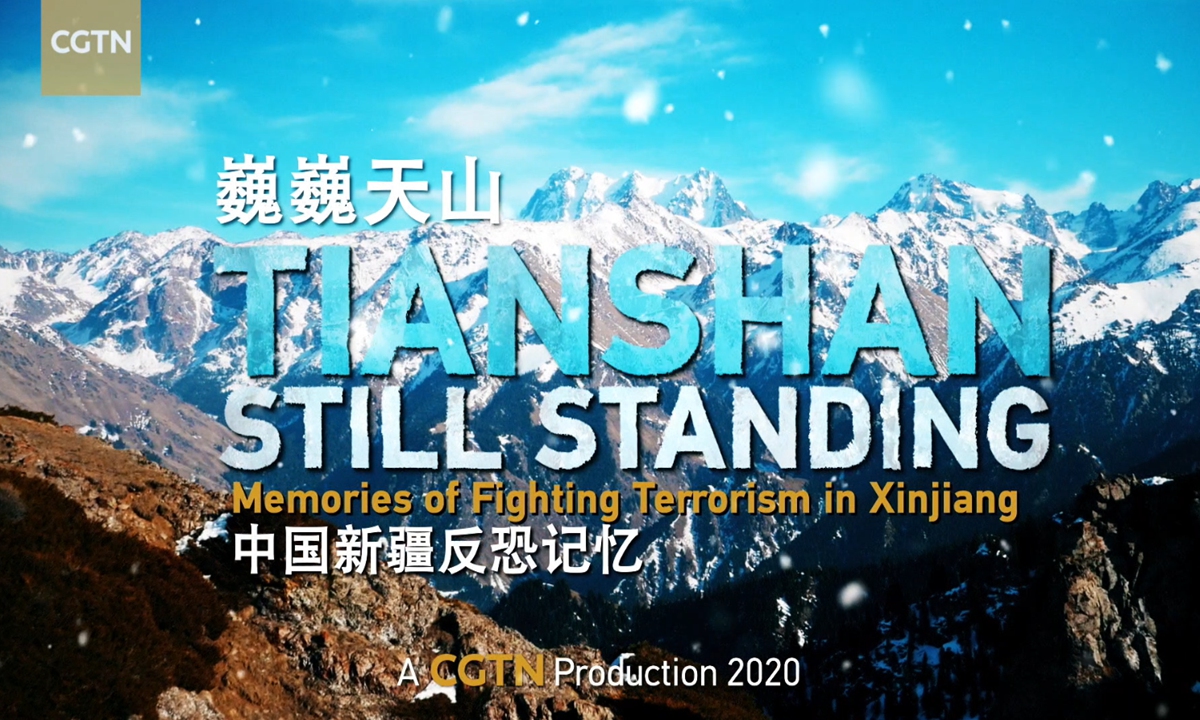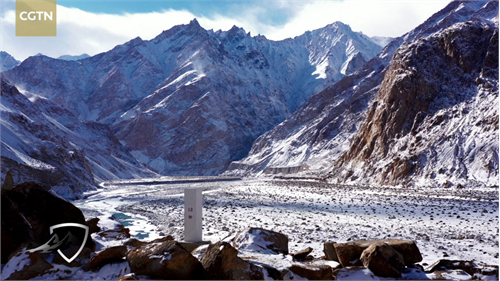
Screenshot of Tianshan Still Standing: Memories of Fighting Terrorism in Xinjiang
The third documentary on the anti-terrorism fight in Northwest China's Xinjiang Uygur Autonomous Region was aired on Friday morning with a number of video clips concerning the region's terrorist activities revealed for the first time. It has caused heated discussions among Chinese netizens, with many expressing their gratitude for those people who made sacrifices to ensure peace and stability in Xinjiang.
The near-one-hour documentary, titled Tianshan Still Standing: Memories of Fighting Terrorism in Xinjiang, was the third episode aired by CGTN since last December. The previous episodes examined the region's anti-terrorism work and the terrorists threatening Xinjiang: the East Turkistan Islamic Movement.
The latest episode has three parts and tells the stories of those police officers who sacrificed themselves in the fight against terrorists, with interviews from civilian victims that survived terrorist attacks, and examines the region's front lines of fighting terrorism.
The documentary looks at the story of Long Fei, a 29-year-old anti-terrorism police officer in the public security bureau of Ili Kazak Autonomous Prefecture, who led his anti-terrorism team to a spot where terrorists hid on April 19, 1998. To protect one companion's safety, Long broke into a nearby house but fell into his own blood after he was shot by a terrorist. Another story is about Memetjan Toxtinyaz, former deputy director of the Aksu public security bureau, who voluntarily offered to replace the herdsman who was taken hostage by terrorists in 2015.
Murat Sheripjan, head of a SWAT team of the public security bureau of Hotan, said in the documentary that, "sometimes we feel like we may not come back when going out for a mission; however, when we begin our work, all dangers are forgotten."
The documentary also focuses on how local civilians have overcome the aftermath of terrorism. Delicamal, a local girl whose legs were severely damaged in a terrorist attack, tells the documentary crew about her subsequent life, and how she overcame difficulties with the help of her family and friends.
As of press time on Friday, the webpage with the hashtag "#Xinjiang memories of anti-terrorism" has been viewed more than 55 million times on Sina Weibo, with netizens commenting that they were deeply touched by the documentary.
"It's different from the previous two episodes, in which a large number of videos exposed the brutality of terrorists; in fact, the third episode uses normal people's stories to tell us how many police officers and civilians have sacrificed their lives for the stability and peace in Xinjiang," one netizen commented.
There have been no violent attacks in Xinjiang for more than three years, which is seen as a great achievement for the anti-terrorism departments.
Certain Western media outlets, which usually celebrate criticism of China's policies in Xinjiang and the region's so-called "camps" or "forced labor," turned blind eyes on the series of documentaries.
On December 9, 2019, Hua Chunying, spokesperson of the Chinese Foreign Ministry, asked Western reporters during the daily press conference, "why do you indulge lies made by people with malicious intentions regarding Xinjiang, but sidestep when truth and facts are placed right in front of you? What is it that you are afraid of?"
Li Weijiang, an expert from Chinese Academy of Social Sciences, told the Global Times that Western media's silence regarding the third documentary may not change, and their silence exposes their hypocrisy of so-called "freedom of the press."
"The West has long been known for their double standards on anti-terrorism, and they only play tough when terrorism threatens their own security and interests," Jia Chunyang, an expert from the China Institutes of Contemporary International Relations, told the Global Times.
Jia said that some anti-China forces may make fake videos or documents in an attempt to distort the influence of China's documentary.

